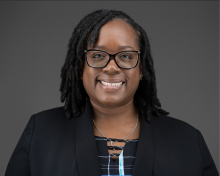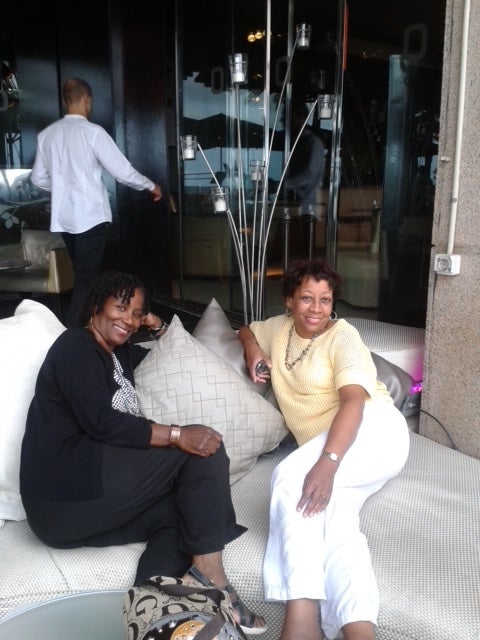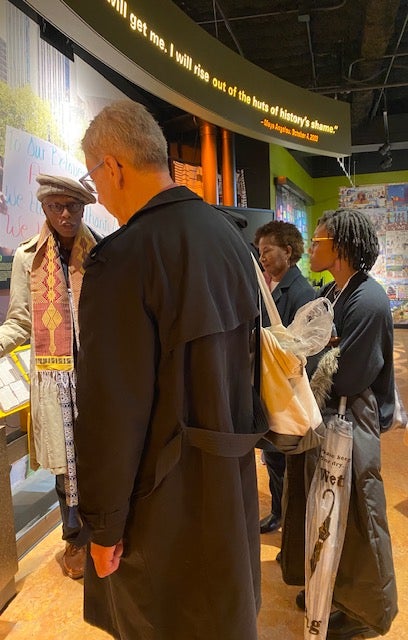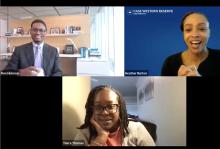President's message
Members of the African American Alumni Association (AAAA),
I hope this message finds you at the start of a restful summer season.
It is my pleasure to greet you all, and my particular honor to congratulate the Case Western Reserve University Class of 2024! Your dedication and tenacity in reaching this point are evident, and I wish you the very best in the next part of your journey. We welcome you, the newest members of AAAA, and encourage you to remain engaged as we continue to celebrate the contributions of African American students, alumni, faculty and staff, create a community of support and advocacy, and build a network of leaders, change agents and champions.
So much has happened over the past few weeks; I hope that one, you enjoy hearing a little more about them in this space, and two, join us! The leadership discussion African Americans at CWRU: Our Legacy – A Conversation is taking place on Tuesday, June 18, and I hope you will join us if you are able.
Learn more about the event and register.
Homecoming is also approaching in November (Nov. 14-17), and we hope to see you there! This homecoming will be incredibly important, as we not only come together in fellowship, but also vote for our leaders who will serve over the next two years. In addition, we will celebrate the accomplishments of fellow alumni during our awards ceremony dinner.
Please nominate your classmates, register to attend the weekend events and think about how you would like to participate with AAAA. If board service is of interest to you, now is your chance!
I am so incredibly proud of the work of AAAA and encourage each of you to join us as we continue providing a community of support for African American Case Western Reserve Students and alumni. As I shared in a LinkedIn reflection last month, there is much work to be done, but it can be done. Join us in that effort in the way that makes most sense for you.
Humbly,
Tiarra Thomas (CWR ’12)
President, African American Alumni Association
tiarra.thomas0619@gmail.com
Back in the Day
Each issue, "Back in the Day" will share the perspectives and experiences of African American alumni of Case Western Reserve. This issue's column features Michele Owens-Patterson (FSM ’71) and Sandra Owens (FSM ’71).
Michele Owens-Patterson and Sandra Owens share a last name and New York origins, but it wasn’t either of these commonalities that led them to cross paths on campus. “Sandi was getting my mail,” Michele said. “I was in another dorm complex,” Sandra said. “And [Michele] was looking for, ‘this other Owens person.’”
The two have been friends ever since.
The Class of 1971 had 11 Black women and two Black men. This low number surprised Owens, who had come from a “pretty-well integrated” high school in New York City. “It was mixed enough that you never felt isolated,” she said. “Whereas at Case [Western Reserve], you did until you started feeling around and finding people.”
Michele Owens-Patterson applied to CWRU from an all-girls high school that “wasn’t diverse at all” and as she was accepted to the university, she received information about a scholarship fund for Black students, noting an emphasis on campus diversity during the admissions process that wasn’t as apparent when she arrived.
Owens-Patterson said she was “familiar with the feeling of being a minority in a larger population,” but added, “I expected something really different when I got to college because I was promised something different,” she said. “I think it’s important for Black students to be aware that this may be how the demographic is and to not underestimate how that can feel.”
Residence hall life in the 1960s and 70s provided both alumnae a sense of community and group autonomy that their classes did not. “You might be the only [Black woman] or there might be a couple of others,” Sandra Owens said. “But in the dorm, this is where we could come together.”
Owens explained in their second year, there were at least six Black women who wanted to room next to each other in Taft House. “They had some kind of lottery system,” she said. “Somehow, we wound up with rooms next to each other and we really kind of took over the floor—and I don’t say that in a negative way—but if we wanted to play cards in the common area, we played cards. We got along with everybody. I guess it was our way of taking some kind of ownership.”
Owens added, “We were spread across different dorms until we decided to make that move, and it may have been the university making the decisions about the dorm rooms. Maybe they figured that this was a good thing to let us room together. I doubt that it was purely coincidental.”
“Eventually, there were eight of us in a row,” Michele Owens-Patterson said.
One of Sandra Owens' roommates got the two involved in the mayoral campaign of Carl Stokes, the first Black mayor of Cleveland. “Sandi’s very modest,” Owens-Patterson said. “What she didn’t say was that her roommate was Stephanie Tubbs Jones.” Tubbs Jones (FSM ’71, LAW ’74) would eventually succeed Stokes’ brother, Louis (HON ’91), in the U.S. House of Representatives.
“[Tubbs Jones] was one of our friends, and so instrumental in us just knowing the city and having fun,” Owens-Patterson said. “We had dinner at her parents’ house and went to her church. She got us involved.”
The sense of community in the residence hall and off campus fueled a new confidence among the group. Owens-Patterson recalled having to call house mothers—the, most often, middle-aged and white women tasked with monitoring residence halls—by their last names, while having to call the Black women who cleaned the buildings by their first names.
“That was one of the things we fought,” Owens-Patterson said. “We told [university officials] it was not appropriate. These were all women. They all had families. They were our elders and we wanted everybody to be treated equally. I think being together like that really, really helped us to have a sense of empowerment in a place where there weren’t that many of us.”
After graduating from Case Western Reserve, Michele Owens-Patterson taught elementary school for five years before pursuing her PhD in clinical psychology. She has operated a private practice for more than 40 years and recently retired as the senior psychologist of Prep for Prep, an education nonprofit that serves gifted students of color in New York City.
Sandra Owens also began her career as an elementary school teacher and went on to dedicate three decades to fundraising—including nearly 25 years serving the United Negro College Fund—before retiring in 2022.
Destination Weekend 2024
The African American Alumni Association (AAAA) was well represented among the more than 140 people registered for the second annual Destination Weekend, which ran from Friday, March 22, to Sunday, March 24, in New York City.
The weekend kicked off with a Friday evening reception, performance and interview at the dance studio of Gina Gibney (WRC ’79; GRS’82, theater), a nationally recognized leader in the intersection of the arts and social justice.
Saturday’s offerings included university-arranged tours at the American Folk Art Museum, the Morgan Library and Museum and the African American Burial Ground National Monument. AAAA member David A. G. Johnson, Jr. (WRC ’73) enlightened attendees at this oldest and largest known North American excavated burial ground for both free and enslaved Africans.
New York residents and AAAA members Sandra Owens (CWR ’71), Michele Owens-Patterson (CWR ’71) and Suzanne Phillips (CWR ’71) enlisted personal contacts to supplement Saturday’s already robust cultural buffet.
Phillips’ cousin, Donna Van Der Zee, widow of award-winning photographer James Van Der Zee, led a tour of his photographs in the Metropolitan Museum of Art’s Harlem Renaissance exhibition, and Owens’ former colleague K.C. Matthews, deputy director at the Schomburg Center for Research in Black Culture, guided guests through this internationally renowned institution.
In addition, these alumni directed participants on the subway, walked with them through the rain and escorted them to Ponty Bistro in Harlem for a dinner of delicious and beautifully presented French and West African cuisine.
The weekend concluded with a Sunday morning breakfast and conversation with Tony Award-nominated actress Elizabeth A. Davis (GRS ’06, theater).
Were you unable to attend Destination Weekend 2024? Enjoy photos taken during the weekend.
We hope you’ll join us for Destination Weekend in Los Angeles in spring 2025. More information to come.
Black Graduation
The climate during the pandemic in 2020, when many of this year’s graduates started college, was as cloudy as the forecasted weather for Black Graduation on Saturday, May 18. Yet, conditions were sunny inside and out at the ninth annual Black Graduation, as graduates received kente stoles, alumni pins and the applause of family, friends and the Case Western Reserve community.
Black Graduation, a pre-commencement ceremony honoring students from the African diaspora, is presented by the Black Student Union (BSU) and supported by several university offices and the African American Alumni Association (AAAA). AAAA Vice President Brian Webster (CWR ’11) extended a hearty welcome to the newest alumni. BSU, under the leadership of President Madison Peebles, hosted the event, featuring themes of community, courage, gratitude and legacy.
Heather Burton, associate vice president and senior director for Faculty and Institutional Diversity, shared: “Let faith be your guiding light and courage your destiny.”
Malik Murray, assistant director of alumni engagement, referenced an African proverb: “If you want to go fast go alone, but if you want to go far, go together.”
Undergraduate senior Danyel Crosby reflected on how the pandemic taught her to go after what she wanted, and graduate student Nneka Onyekwuluje reminded honorees that not only did they stand on the shoulders of such notable alumni as civil rights attorney Fred D. Gray (LAW ’54) and former Congresswoman Stephanie Tubbs Jones (CWR ’71, LAW ’74), but on this day, they too joined the legacy. “You bet on yourselves and won,” said Onyekwuluje.
Keynote speaker, activist and author Don Freeman (CWR ’61), ended the program with a more sobering viewpoint. “We are still a divided people. Let’s address the things that divide us,” challenged Freeman. “Be involved in the work of preventing police brutality, bringing about genuine democracy, achieving substantive education for African Americans and inspiring each other. Reflect on what lies behind us, as we embark on what lies ahead.”
The celebration continued with a reception following the program.
A special thank you to Randy Blackford, senior assistant director for multicultural education and outreach, for sharing these photos from Black Graduation.
BrightCrowd
BrightCrowd is a private space where you can share with other African American Alumni Association members. Many AAAA alumni have already created their BrightCrowd pages for connecting with other alumni and sharing professional and personal life updates, cherished memories from their time at Case Western Reserve, accomplishments and family photos. Your page is a place to capture your impact for future generations. Be a part of our legacy.
- Sign up with your preferred email address for access.
- Enter the case-sensitive access code: cwruaaaa.
- Follow the instructions in the email from BrightCrowd to verify your email address.
- Begin creating your page!
Save the date
Case Western Reserve University cordially invites you to a leadership conversation for African American alumni at Linsalata Alumni Center, 11310 Juniper Road, Cleveland Ohio 44106, from 5:30 to 7:00 p.m. on Tuesday, June 18, 2024. This is an opportunity to learn about the university’s strategic initiatives for African American students, faculty, alumni and the surrounding community. The event is hosted by Constance Hill-Johnson (WRC ’80), Chairperson Board of Directors, The Cleveland Foundation.
Light refreshments will be provided.
Questions may be directed to Nichelle Daniels at nichelle.daniels@case.edu or 216.368.0405.
2024 African American Alumni Association Award nominations are open
Every other year, the African American Alumni Association (AAAA) honors those who have made their university proud. The nominations for these awards come from you. Read about the awards and select the award that fits your nominee best. Self-nominations are welcome and encouraged.
Please see the award categories, criteria and previous winners here.
An individual can neither win the same award twice, nor receive two different AAAA awards in the same year.
Nominations must be received by 11:59 p.m. EDT on Saturday, August 31, 2024. Awardees will be honored at this year’s AAAA homecoming event the evening of Saturday, November 16, 2024.
Seeking leaders
The African American Alumni Association will hold elections for officers and the Board of Directors at its biennial membership meeting on the morning of November 16, 2024. Please help us identify future leaders by making nominations. Self-nominations are permitted.
Nominations must be received by 11:59 p.m. EDT on Saturday, August 31, 2024.
Please speak with those you plan to nominate to be sure they are interested in the positions. Let them know why you think they would be good candidates and indicate how you will be available to provide support. Nominees will be contacted to confirm interest in being considered for the positions, and brief bios will be requested. Candidates must either be present at the meeting or have someone present to serve as their designee. All candidates/designees will be asked to provide a statement. The meeting will offer a virtual option.
You may nominate more than one member for each position. Please separate the names with a comma.
No person may run for more than one position on the ballot.
Learn more about officer and Board of Directors elections and nominate.
Reach beyond legacy
Diverse populations generate necessary conversations, exchange viewpoints, and produce inclusive advancements that our world desperately needs. Our giving campaign, Reach Beyond Legacy, aims to honor past trailblazers and support current and future students. We call on our alumni and friends to honor and build upon the past valuing its impact on the future. We are reaching beyond legacy as we envision something bigger and better.
One of the diversity scholarship funds is the Frank “Doc” Kelker Scholarship.
Frank “Doc” Kelker (ADL ’38) first achieved athletic fame at Dover High School in Ohio, where he led the football team through two undefeated seasons and led the basketball team to a state championship. He brought his talents to Western Reserve University when he enrolled in Adelbert College in 1935. Kelker had a full-tuition scholarship and worked mornings and evenings as a janitor to cover the cost of room and board.
Working, however, did not affect his athleticism. At Western Reserve, Kelker earned nine varsity letters, three each in football, basketball and track. He was named All-American in basketball, broke school records in the 100-yard-dash and the quarter mile and was selected Outstanding Senior Student for 1937 and 1938. Kelker graduated in 1938 with a bachelor’s degree in sociology, however the color barrier in professional sports kept him from advancing to the NFL.
Because his ambition was to “direct young people toward meaningful lives,” in 1940, Kelker accepted a position with the YMCA, the organization to which he devoted his entire career. He used his athletic ability to train and inspire others, including the trailblazing politicians Carl and Louis (HON ’91) Stokes, and he used his degree in a lifetime of public service. Among his many civic contributions were his roles as founding trustee and board chair of Cuyahoga Community College.
The Frank “Doc” Kelker Scholarship, established in his honor by Harold McRae (ADL ’65) in 1997, seeks to offset the costs of attending Case Western Reserve and to “remove the barriers between young scholars and their potential”. Please consider donating to this scholarship or another in AAAA’s Reach Beyond Legacy initiative.
Profiles of Inclusive Excellence
The African American Alumni Association of Case Western Reserve University, in partnership with the university’s Office for Diversity, Equity and Inclusive Engagement, and the African American and African studies minor, continues to present Profiles of Inclusive Excellence. Heather Burton, PhD, associate vice president and senior director for faculty and institutional diversity holds in- depth conversations with faculty and staff from across the campus.
The March speaker was Dexter R. Voisin, dean of the Jack, Joseph and Morton Mandel School of Applied Social Sciences. Our April speaker was Ronald Hickman (CWR ’00; NUR ’06, ’13; GRS ’08, nursing), the Ruth M. Anderson Endowed Professor and associate dean for research at Case Western Reserve University’s the Center for Research and Scholarship at Frances Payne Bolton School of Nursing.
Head to the Profiles of Inclusive Excellence page to watch these and other recordings. The program will begin again in the fall of 2024.
Alumni Association perks
In addition to receiving a great education and making lifelong connections, these travel, shopping, and service discounts are other benefits of having attended Case Western Reserve.
Do you have your own business?
Are you a Black alum with a business? August is National Black Business Month, and we would love to promote your business in the newsletter and/or include it in the African American Alumni Association Directory of Black Businesses. It can be your primary source of income, or hobby that has grown into your passion.
Please send your name, affiliation, business name and focus, and business email, website, and/or phone number to alumnirelations@case.edu
What would you like to see highlighted in future newsletters? Have news to share? Know someone who wants to receive AAAA communications? Contact us at alumnirelations@case.edu.
Want to become a member? Just fill out the form.
Remember to visit our webpage and like and follow our Facebook page.






